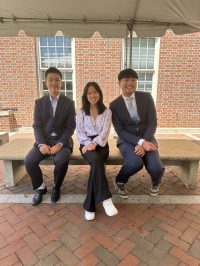The Abstract: August 28, 2023

August 28, 2023
Whether you’re local or global, student or alumni, the Abstract’s weekly news digest will help you stay in the loop with our amazing Gillings School community.
New epidemiology research suggests benefits to physical activity before pregnancy

Dr. Kelly Evenson

Dr. Tania Desrosiers
A new study co-led by Professor of Epidemiology Kelly Evenson, PhD, and Associate Professor Tania Desrosiers, PhD, published this month in Nature: Pediatric Research, has found that children born to mothers who engage in physical activity before pregnancy and spend less time sitting before pregnancy see a decrease in the risk for some birth defects.
Using data from two population-based case-control studies, the research team found that mothers who engaged in physical activity in the three months before pregnancy saw reduced odds of five birth defects: spina bifida, cleft palate, anorectal atresia, hypospadias and transverse limb deficiency. They also saw greater odds of two birth defects: anencephaly and gastroschisis. Mothers who spent less time sitting in the three months before pregnancy saw reduced odds of two birth defects, anorectal atresia and hypospadias, and higher odds of cleft lip with or without cleft palate.
While the results showed that less time sitting and more physical activity before pregnancy correlated to a higher risk of a small number of birth defects, Evenson and Desrosiers said that the results require further study to confirm and gain a greater understanding of the mechanisms by which physical activity and sitting behaviors might influence the risk of certain birth defects.
“When considering the balance between benefits and harms, there is more benefit to engaging in physical activity prior to pregnancy with respect to birth defects than there is concern,” Evenson explained. “In general, our findings support the broader recommendations for physical activity for women before and during pregnancy.”
The objectives of this study were primarily to generate hypotheses and contribute to the limited body of research on the relationship between birth defects and physical activity. Evenson and Desrosiers note theirs is the first study of sitting time and birth defects and is the largest study to date of physical activity and birth defects.
Other researchers at the Gillings School included doctoral student Sanjida Mowla; Interim Associate Dean for Research and Barbara S. Hulka Distinguished Professor Andrew Olshan, PhD, and biostatistics doctoral alumna Neha Joshi, PhD.
Department of Biostatistics hosts second summer undergraduate internship program
The Department of Biostatistics recently completed its second annual Biostatistics Undergraduate Summer Internship (BUSI) Research Symposium — a culmination of the summer research experience for interns in the department’s BUSI program.

BUSI graduate directors Leo Li and Shravani Chitineni
This year’s program, directed by biostatistics graduate students Leo Li and Shravani Chitineni, featured 12 participating interns and 10 presentations.

This year’s BUSI symposium poster winners were Katherine Xing, Yiyang (Phillip) Fan and Theo Wu.
The 2023 Best Poster Award winners included:
- Katherine Xing (Best Poster Award): “Cross-Platform Comparison of Type 2 Diabetes Proteomic Signatures in the Jackson Heart Study”
- Yiyang (Philip) Fan (Best Poster Award): “Interpretable and Highly Accurate Survival Tree Ensemble”
- Theo Wu (Honorable Mention): “Predicting PrEP Knowledge and Acceptability among PrEP-Indicated individuals with Criminal Legal Experiences”
Congratulations to all who participated. Check out photos from the event!
New student-led study published in Injury Epidemiology

Molly Remch
Molly Remch, doctoral student in epidemiology, led a newly published study in collaboration with assistant professors Anna Austin, PhD, and Rebecca Naumann, PhD, titled “Evaluation of a prison violence prevention program: impacts on violent and non-violent prison infractions.”
The research was a partnership between UNC’s Injury Prevention Research Center and North Carolina’s Department of Adult Corrections, in which they evaluated a new N.C. prison violence prevention program: the Rehabilitative Diversion Unit (RDU). They found the unit effectively reduced violence while men were enrolled in the program but benefits were not sustained after program completion.
According to the study, continued programming may be a useful tool to transition men from the programmatically intensive environment of the RDU to the general prison population. The study team also recommended the expansion of evidence-based treatment for substance use disorder.
Zhu receives NIH funding to study genetics and Alzheimer’s Disease

Dr. Hongtu Zhu
Congratulations to Professor Hongtu Zhu, PhD, in the Department of Biostatistics, who has received more than $2 million in funding from the National Institutes of Health (NIH) National Institute on Aging for research titled “Mapping the Causal Genetic-Imaging-Clinical Pathway for Alzheimer’s Disease.” The study’s co-PI, Bingxin Zhao, PhD, is a Gillings alumnus and assistant professor of statistics and data science at the University of Pennsylvania. The research team aims to map the causal genetic-imaging-clinical (CGIC) pathway for Alzheimer’s Disease through jointly harmonizing and analyzing genetic, imaging and clinical data across multiple biomedical studies.
Vizuete receives new grant from Environmental Defense Fund

Dr. William Vizuete
Congratulations to Professor Will Vizuete, PhD, in the Department of Environmental Sciences and Engineering, who has received funding from the Environmental Defense Fund for a project he is co-leading with the organization titled “Assessment of Ambient Air Pollution Associated with Wood-Pellet Manufacturing.”
